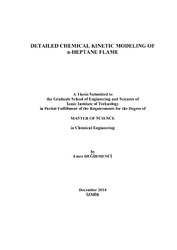Please use this identifier to cite or link to this item:
https://hdl.handle.net/11147/7176| Title: | Detailed Chemical Kinetic Modeling of N-Heptane Flame | Other Titles: | Detaylı Kimyasal Kinetik Modelleme ile N-heptan Yanmasının Modellenmesi | Authors: | Değirmenci, Emre | Advisors: | İnal, Fikret | Keywords: | Chemical reactions Motor fuels n-heptane Comprehensive combustion kinetics |
Publisher: | Izmir Institute of Technology | Source: | Değirmenci, E. (2018). Detailed chemical kinetic modeling of n-heptane flame. Unpublished master's thesis, Izmir Institute of Technology, Izmir, Turkey | Abstract: | To understand the complex combustion characteristics of gasoline, n-heptane is used as one of the two major reference fuels. The emissions resulted from incomplete combustion are one of the main issues caused from usage of high amount of fossil fuels in transportation and energy generation sectors. The main purpose of this study is to model one-dimensional premixed, laminar, burner-stabilized fuel-rich n-heptane flame to understand its combustion characteristics in mainly fuel-rich conditions. Detailed chemical kinetic modeling technique was used to get high amount of information about the ignition characteristics of n-heptane and formation nature of emissions. A detailed chemical kinetic mechanism was generated by combining several mechanisms from the literature that related with possible products of fuel-rich n-heptane combustion. The detailed mechanism consists of 4185 reactions and 893 species. Validations of the model were done with various experimental data available in the literature such as premixed laminar flames and jet stirred reactors. After generating the kinetic model, detailed investigation of the n-heptane flame was done by using rate of production, reaction sensitivity and reaction pathway analyses. One of the attributes of fuel-rich flames, Polycyclic aromatic hydrocarbon (PAH) formation kinetics were also investigated. Acetylene (C2H2), propargyl radical (C3H3), and vinylacetylene (C4H4) were found as the main precursors of the first aromatic ring and PAH formation as a result of pathway and rate of production analyses. The generated model was able to predict most of the major, minor and trace components that formed in the flame that modeled. A reduced model was also generated by using directed relation graph with error propagation (DRGEP) mechanism reduction technique on the detailed mechanism. The reduced mechanism consists of 1879 reactions and 359 species. The species mole fraction predictions of detailed and reduced mechanism were very close to each other. Most of the species formed in the flame were predicted by the reduced mechanism with less computational afford than detailed mechanism. Benzinin karmaşık yanma özelliklerini anlamak için kullanılan iki ana referans yakıttan birisi n-heptandır. Ulaşım ve enerji üretimi sektörlerinde yüksek miktarda fosil yakıt kullanımı nedeniyle ortaya çıkan temel sorunlardan birisi eksik yanma sonucu açığa çıkan emisyonlardır. Bu çalışmanın temel amacı, yakıt açısından zengin koşullarda nheptanın yanma özelliklerini anlayabilmektir. Bu sebeple tek boyutlu önceden karıştırılmış, laminar, yakıt bakımından zengin n-heptan alevi detaylı kimyasal kinetik modelleme (DKKM) tekniği kullanılarak modellenmiştir. DKKM tekniği sayesinde nheptanın tutuşma özellikleri ve emisyonların oluşum özellikleri kapsamlı bir sekilde incelenebilmiştir. Literatürden çeşitli mekanizmaların birleştirilmesiyle detaylı bir kimyasal kinetik mekanizma oluşturulmuştur. Detaylı mekanizma 4185 reaksiyon ve 893 türden oluşmaktadır. Modelin doğrulanması, literatürden elde edilen önceden karıştırılmış laminar alevler ve jetle karıştırılan reaktörler gibi çeşitli deneysel verilerle yapılmıştır. Kinetik model oluşturulduktan sonra, n-heptan alevinin ayrıntılı araştırması, üretim hızı, reaksiyon duyarlılığı ve reaksiyon yolu analizleri kullanılarak yapılmıştır. Yakıt açısından zengin alevlerin özelliklerinden biri olan polisiklik aromatic hidrokarbon (PAH) oluşumunun kinetiği de araştırılmıştır. Üretim hızı analalizleri sonucu asetilen (C2H2), propargil radikali (C3H3) ve vinilasetilen (C4H4) ilk aromatik halkanın ve PAH oluşumunun ana öncüleri olarak bulunmuştur. Modellenen alevde oluşan birincil (major), ikincil (minor) ve eser türlerin çoğu geliştirilen mekanizma ile tahmin edilmiştir. Detaylı modelde mekanizma indirgeme tekniği kullanılarak oluşturulan iskelet bir mekanizma da geliştirilmiştir. İndirgenmiş mekanizma 1879 reaksiyon ve 359 türden oluşmaktadır. İndirgenmiş mekanizma, alevde oluşan bileşiklerin çoğunu daha az hesaplama gücü kullanarak tahmin edebilmeyi başarmıştır. |
Description: | Thesis (Master)--Izmir Institute of Technology, Chemical Engineering, Izmir, 2018 Includes bibliographical references (leaves: 96-102) Text in English; Abstract: Turkish and English |
URI: | https://hdl.handle.net/11147/7176 |
| Appears in Collections: | Master Degree / Yüksek Lisans Tezleri |
Files in This Item:
| File | Description | Size | Format | |
|---|---|---|---|---|
| T001856.pdf | MasterThesis | 9.42 MB | Adobe PDF |  View/Open |
CORE Recommender
Page view(s)
296
checked on Mar 31, 2025
Download(s)
606
checked on Mar 31, 2025
Google ScholarTM
Check
Items in GCRIS Repository are protected by copyright, with all rights reserved, unless otherwise indicated.